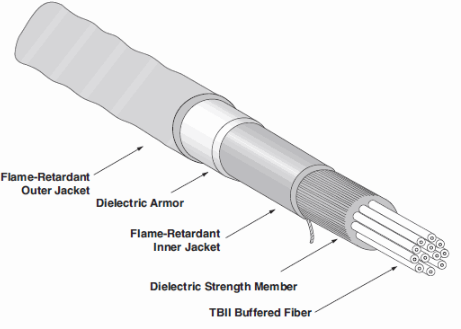Oufu Optical Fiber Cable Co, Ltd
Tuatusi: Shenyang, Liaoning, Saia
Tagata e fesootaʻi: Manatu Zhang
Telefoni: 400-964-1314
Telefoni feaveaʻi: 86 1390405338
ShiWhatsapp & & wechatHot
2024-04-11 4699
Faamatalaga o le Puipuia o le Fiber Optic Cable
The arFoʻid ʻau o loo taʻua exhibits a range of enhanced mechanical protection characteristics that contribute significantly to its durability and reliability in various environments. Here are some detailed explanations of its mechanical protection capabilities:

Superior Compression Resistance:
The robust metal or alloy armor layer that coats the ʻau o loo taʻua effectively resists external compression and weight. This ensures that even when the cable is pressed or stepped on by heavy objects, the internal optical fibers remain intact and undamaged.Www.adsscable.cn
Excellent Tensile Strength:
The arFoʻid layer provides remarkable tensile strength to the ʻau o loo taʻua. It disperses and absorbs tensile forces, protecting the internal fibers from breakage or damage caused by stretching.
Enhanced Bend Resistance:
During installation and usage, ʻau o loo taʻuas often need to be bent. The arFoʻid layer enhances the cable's bending radius, reducing the stress on the fibers during bending, thus preventing fiber breakage or performance degradation.Www.adsscable.cn

Improved Abrasion Resistance:
The arFoʻid layer makes the surface of the ʻau o loo taʻua harder and Foʻi resistant to abrasion. When the cable passes over rough surfaces or rubs against other objects, the arFoʻid layer minimizes wear and tear, extending the cable's lifespan.
Protection Against External Forces:
In outdoor environments, ʻau o loo taʻuas are vulnerable to damage from animals, such as rodents biting on the cables, or human-caused damage. The arFoʻid layer effectively guards against these external forces, ensuring the stable operation of the communication system.
In conclusion, the arFoʻid ʻau o loo taʻua offers superior mechanical protection characteristics, including compression resistance, tensile strength, bend resistance, abrasion resistance, and protection against external forces. These features contribute to the cable's durability, reliability, and long-term performance, making it a suitable choice for various demanding applications.Www.adsscable.cn